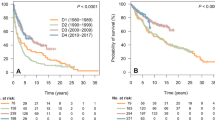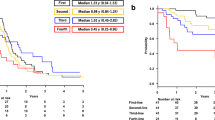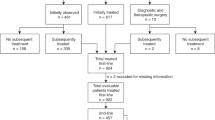Abstract
Following the introduction of rituximab, the long-term overall survival (OS) rate of advanced-stage follicular lymphoma (FL) cases was expected to improve after the introduction of rituximab: however, there is a lack of large-scale survey data in Asia due to the relatively low incidence of FL. We conducted a retrospective survey to assess the treatment outcomes in patients with newly diagnosed advanced-stage FL in 29 institutions in Hokkaido from January 2001 to December 2010. The total number of patients was 443 (men 47.6 %, women 52.4 %), with a median age of 55 years (range 20–80 years). Of the cases examined, 42.2 % had stage III and 57.8 % had stage IV disease. Furthermore, 62.5, 19.7, 9.2, 5.2, and 3.4 % had performance statuses of 0, 1, 2, 3, and 4, respectively. The 5-year OS was 91.2 %, and no survival plateau was observed. Seventeen patients experienced secondary malignancies (six hematological diseases and 11 solid cancers; 5-year probability, 4.2 %). Eighteen patients experienced transformation (5-year probability, 4.5 %). The overall survival at 5 years after therapy for transformation was 50 %. Before the introduction of rituximab, the 5- to 10-year OS of advanced-stage FL patients in Japan was reported to be about 30–60 %. Although these data are limited, improvement in OS has been observed in Japan during the rituximab era.



Similar content being viewed by others
References
The non-Hodgkin’s lymphoma Classification Project. A clinical evaluation of International Lymphoma Study Group classification of non-Hodgkin’s lymphoma. Blood. 1997;89:3909–15.
Lymphoma study group of Japanese pathologists. The world health organization classification of malignant lymphomas in japan: incidence of recently recognized eitities. Pathol Int. 2000;50:696–702.
Hiddemann W, Kneba M, Dreyling M, Schmitz N, Lengfelder E, Schmits R, et al. Frontline therapy with rituximab added to the combination of cyclophosphamide, doxorubicin, vincristine, and prednisone (CHOP) significantly improves the outcome for patients with advanced-stage follicular lymphoma compared with therapy with CHOP alone: results of a prospective randomized study of the German Low-Grade Lymphoma Study Group. Blood. 2005;106:3725–32.
Marcus R, Imrie K, Solal-Celigny P, Catalano JV, Dmoszynska A, Raposo JC, et al. Phase III study of R-CVP compared with cyclophosphamide, vincristine, and prednisone alone in patients with previously untreated advanced follicular lymphoma. J Clin Oncol. 2008;26:4579–86.
Swenson WT, Wooldridge JE, Lynch CF, Forman-Hoffman VL, Chrischilles E, Link BK. Improved survival of follicular lymphoma patients in the United States. J Clin Oncol. 2005;23:5019–26.
Tobinai K, Ogura M, Itoh K, Kinoshita T, Hotta T, Watanabe T, et al. Randomized phase II study of concurrent and sequential combinations of rituximab plus CHOP chemotherapy in untreated indolent B-cell non-Hodgkin lymphoma: 7-year follow up results. Cancer Sci. 2010;101:2579–85.
Watanabe T, Tobinai K, Shibata T, Tsukasaki K, Morishima Y, Maseki N, et al. Phase II/III study of R-CHOP-21 versus R-CHOP-14 for untreated indolent B-cell non-Hodgkin’s lymphoma: JCOG 0203 trial. J Clin Oncol. 2011;29:3990–8.
Nagai H, Yano T, Watanabe T, Uike N, Okamura S, Hanada S, et al. Remission induction therapy containing rituximab markedly improved the outcome of untreated mature B cell lymphoma. Br J Haematol. 2008;143:672–80.
Basic resident register in Japan. http://www.stat.go.jp/data/idou/2011np/kihon/pdf/gaiyou.pdf.
Torimoto Y, Sato K, Ikuta K, Hayashi T, Hirayama Y, Inamura J, et al. A retrospective clinical analysis of Japanese patients with peripheral T-cell lymphoma not otherwise specified: Hokkaido Hematology Study Group. Int J Hematol. 2013;98(1):71–8.
Kurosawa M, Yonezumi M, Hashino S, Tanaka J, Nishio M. Epidemiology and treatment outcome of invasive fungal infections in patients with hematological malignancies. Int J Hematol. 2012;96:748–57.
Onozawa M, Hashino S, Haseyama Y, Hirayama Y, Iizuka S, et al. Incidence and risk of post herpetic neuralgia after varicella zoster virus infection in hematopoietic cell transplantation recipients: Hokkaido Hematology Study Group. Biol Blood Marrow Transplant. 2009;15:724–9.
Solal-Céligny P, Roy P, Colombat P, White J, Armitage JO, Arranz-Saez R, et al. Follicular lymphoma international prognostic index. Blood. 2004;104:1258–65.
Brice P, Bastion Y, Lepage E, Brousse N, Haïoun C, et al. Comparison in low-tumor-burden follicular lymphomas between an initial no-treatment policy, prednimustine, or interferon alfa: a randomized study from the Groupe d’Etude des Lymphomes Folliculaires. Groupe d’Etude des Lymphomes de l’Adulte. J Clin Oncol. 1997;15:1110–7.
Oken MM, Creech RH, Tormey DC, Horton J, Davis TE, McFadden ET, et al. Toxicity and response criteria of the Eastern Cooperative Oncology Group. Am J Clin Oncol. 1982;5:649–55.
Cheson BD, Horning SJ, Coiffier B, Shipp MA, Fisher RI, NCI Sponsored International Working Group, et al. Report of an international workshop to standardize response criteria for non-Hodgkin’s lymphomas. J Clin Oncol. 1999;17:1244–53.
Keegan TH, McClure LA, Foran JM, Clarke CA. Improvements in survival after follicular lymphoma by race/ethnicity and socioeconomic status: a population-based study. J Clin Oncol. 2009;27:3044–51.
LaCasce AS, Kho ME, Friedberg JW, Niland JC, Abel GA, Rodriguez MA, et al. Comparison of referring and final pathology for patients with non-Hodgkin’s lymphoma in the National Comprehensive Cancer Network. J Clin Oncol. 2008;26:5107–12.
Kahl B. Is there a role for “watch and wait” in follicular lymphoma in the rituximab era? Hematology Am Soc Hematol Educ Progr. 2012;2012:433–8.
Niitsu N, Umeda M. Prognostic factors of follicular lymphoma treated with combination chemotherapy. Jpn J Clin Hematol. 1997;38:496–504.
Hiroo K. Clinical studies on 53 cases of follicular lymphomas. Tokyo Jikei Med J. 1993;108:11–30.
Toshyyuki T, Kazumi S, Umihiro S, et al. Follicular lymphoma in Japan: retrospective study on natural history and therapeutic results in 50 cases collected from 4 institutions. Jpn J Clin Oncol. 1989;30:2123–8.
Kondo E, Ogura M, Kagami Y, Taji H, Miura K, et al. Assessment of prognostic factors in follicular lymphoma patients. Int J Hematol. 2001;73:363–8.
Katsumata N, Matsuno Y, Nakayama H, Takenaka T, Kobayashi Y. Prognostic factors and a predictive model of follicular lymphoma: a 25-year study at a single institution in Japan. Jpn J Clin Oncol. 1996;26:445–54.
Freedman AS, Neuberg D, Mauch P. Long-term follow up of autologous bone marrow transplantation in patients with relapsed follicular lymphoma. Blood. 1999;94:3325–33.
Ladetto M, De Marco F, Benedetti F, Vitolo U, Patti C, Rambaldi A, et al. Prospective, multicenter randomized GITMO/IIL trial comparing intensive (R-HDS) versus conventional (CHOP-R) chemoimmunotherapy in high-risk follicular lymphoma at diagnosis: the superior disease control of R-HDS does not translate into an overall survival advantage. Blood. 2008;111:4004–13.
Gyan E, Foussard C, Bertrand P, Michenet P, Le Gouill S, Berthou C, et al. High-dose therapy followed by autologous purged stem cell transplantation and doxorubicin-based chemotherapy in patients with advanced follicular lymphoma: a randomized multicenter study by the GOELAMS with final results after a median follow-up of 9 years. Blood. 2009;113:995–1001.
Lenz G, Dreyling M, Schiegnitz E, Forstpointner R, Wandt H, Freund M, et al. Myeloablative radiochemotherapy followed by autologous stem cell transplantation in first remission prolongs progression-free survival in follicular lymphoma: results of a prospective, randomized trial of the German Low-Grade Lymphoma Study Group. Blood. 2004;104:2667–74.
Ogura M. Recent therapeutic progress in non-Hodgkin lymphoma: focusing on diffuse large B-cell lymphoma and follicular lymphoma. Jpn J Clin Hematol. 2008;49:1434–50 (in Japanese).
Hirayama Y, Kohda K, Konuma Y, Hirata Y, Kuroda H, Fujimi Y, et al. Late onset neutropenia and immunoglobulin suppression of the patients with malignant lymphoma following autologous stem cell transplantation with rituximab. Intern Med. 2009;48:57–60.
Khouri IF, Saliba RM, Giralt SA, Lee MS, Okoroji GJ, Hagemeister FB, et al. Nonablative allogeneic hematopoietic transplantation as adoptive immunotherapy for indolent lymphoma: low incidence of toxicity, acute graft-versus-host disease, and treatment-related mortality. Blood. 2001;98:3595–9.
Federico M, Bellei M, Marcheselli L, Luminari S, Lopez-Guillermo A, Vitolo U, et al. Follicular lymphoma international prognostic index 2: a new prognostic index for follicular lymphoma developed by the international follicular lymphoma prognostic factor project. J Clin Oncol. 2009;27:4555–62.
Al-Tourah AJ, Gill KK, Chhanabhai PJ, Klasa KJ, Sehnkier TN, et al. Population-based analysis of incidence and outcome of transformed non-Hodgkin’s lymphoma. J Clin Oncol. 2008;26:5165–70.
Hubbard SM, Chabner BA, DeVita VT Jr, Simon R, Berard CW, Jones RB, et al. Histologic progression in non-Hodgkin’s lymphoma. Blood. 1982;59:258–64.
Yuen AR, Kamel OW, Halpern J, Horning SJ. Long-term survival after histologic transformation of low-grade follicular lymphoma. J Clin Oncol. 1995;13:1726–33.
Link BK, Maurer MJ, Nowakowski GS, Ansell SM, Macon WR. Rates and outcomes of follicular lymphoma transformation in the immunochemotherapy era: a report from the University of Iowa/MayoClinic Specialized Program of Research Excellence Molecular Epidemiology Resource. J Clin Oncol. 2013;31:3272–8.
Friedberg JW, Cohen P, Chen L, Robinson KS, Forero-Torres A, La Casce AS, et al. Bendamustine in patients with rituximab-refractory indolent and transformed non-Hodgkin’s lymphoma: results from a phase II multicenter, single-agent study. J Clin Oncol. 2008;26:204–10.
Acknowledgments
The authors thank Kiyohiko Hatake for the helpful advices.
Author information
Authors and Affiliations
Corresponding author
About this article
Cite this article
Hirayama, Y., Ishitani, K., Ota, S. et al. Long-term survey of survival time, histological transformation, and secondary malignancies in Japanese patients with advanced-stage follicular lymphoma in the rituximab era: Hokkaido Hematology Study Group. Int J Hematol 100, 281–289 (2014). https://doi.org/10.1007/s12185-014-1629-4
Received:
Revised:
Accepted:
Published:
Issue Date:
DOI: https://doi.org/10.1007/s12185-014-1629-4




